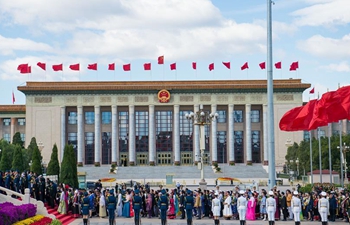LONDON, Oct. 1 (Xinhua) -- The continued uncertainty around Brexit and the trade wars launched by U.S. President Donald Trump are weighing heavily on investment prospects on British industry, according to a survey of top businesses issued on Monday.
British industry body EEF revealed in its Monday survey that sentiments around investment in industry had hit an historic low.
The survey, Investment Monitor 2018/19 found a total of two thirds of companies intend to hold off increasing investment in next two years, an increase from the 50 percent figure in the same survey last year.
And just one third are planning to invest more, the lowest figure in survey's history.
Almost a third of companies say that political uncertainty is the reason they are not investing more. This figure is higher than the figure of 25 percent of firms in the immediate aftermath of the Brexit referendum.
Brexit is now a more significant factor holding back investment than a year ago, with new data revealing modern machinery and building upgrades most a risk of cutbacks.
Just over half of companies, 51 percent, said investment in plant and machinery had been put on hold because of Brexit negotiations and over a third, 36 percent, have shelved plans to invest in new and improved buildings.
Other areas of investment are not immune with a significant proportion of research and development programs and Information Technology systems on hold.
Lee Hopley, chief economist for EEF, told Xinhua in an interview on Monday afternoon: "Issues around Brexit need to be addressed, making sure companies have some certainty and better visibility about their order books.
She said a decision on Brexit would "create a climate of greater confidence for British industry".
"Things could be different in three or six months time but it is hard to judge at this point," Hopley added.
"We dug into the data and we found the investments most at risk because of Brexit negotiations are the big, long-term expensive assets which are being put on hold.
"This includes new plant and equipment, and new and improved buildings -- these are things most at risk of being put on ice until there is more clarity about the Brexit outcome."
Hopley said that in theory companies can push these decisions into the future "but there comes a point where your competitiveness, your profitability and what your competitors are doing really need to come into the mix of where companies choose to invest in the future," exposing the reality that investment will be driven out of Britain and into other countries without a clear and satisfactory deal.
It's not just Brexit uncertainty that is making British firms hesitate before investing in their businesses.
More than one third of companies citing order book uncertainty with overseas markets, reflecting the rise in trade tensions unleashed by the tariff wars started by U.S. President Donald Trump.
Hopley said: "Uncertainty over the international situation is something that we have picked up in this survey particularly. A year ago when we asked companies about their prospects for the next year this worry about increased U.S. protectionism was something that was bubbling under the surface.
"The de-escalation of trade tensions would certainly help investment in British firms."
Britain is the world's sixth largest economy according to International Monetary Fund (IMF) figures, at about 2.565 trillion U.S. dollars in terms of GDP, so any significant downturn in expectations for investment represents a significant turn of events.
EEF is the manufacturers' organization representing 20,000 manufacturing companies.













